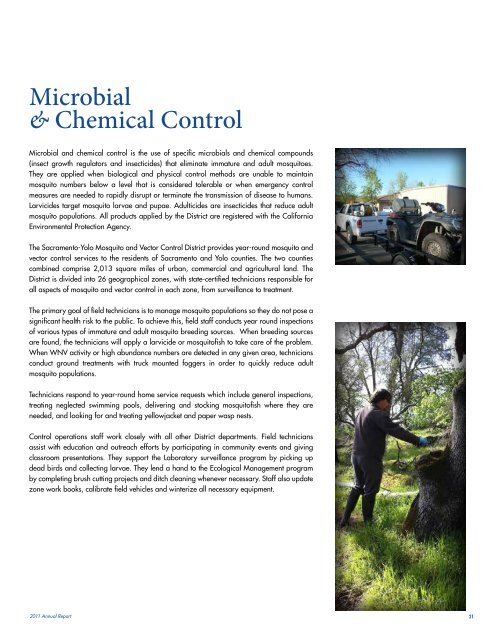2011 Annual Report - Sacramento-Yolo Mosquito & Vector Control ...
2011 Annual Report - Sacramento-Yolo Mosquito & Vector Control ...
2011 Annual Report - Sacramento-Yolo Mosquito & Vector Control ...
You also want an ePaper? Increase the reach of your titles
YUMPU automatically turns print PDFs into web optimized ePapers that Google loves.
Microbial& Chemical <strong>Control</strong>Microbial and chemical control is the use of specific microbials and chemical compounds(insect growth regulators and insecticides) that eliminate immature and adult mosquitoes.They are applied when biological and physical control methods are unable to maintainmosquito numbers below a level that is considered tolerable or when emergency controlmeasures are needed to rapidly disrupt or terminate the transmission of disease to humans.Larvicides target mosquito larvae and pupae. Adulticides are insecticides that reduce adultmosquito populations. All products applied by the District are registered with the CaliforniaEnvironmental Protection Agency.The <strong>Sacramento</strong>-<strong>Yolo</strong> <strong>Mosquito</strong> and <strong>Vector</strong> <strong>Control</strong> District provides year-round mosquito andvector control services to the residents of <strong>Sacramento</strong> and <strong>Yolo</strong> counties. The two countiescombined comprise 2,013 square miles of urban, commercial and agricultural land. TheDistrict is divided into 26 geographical zones, with state-certified technicians responsible forall aspects of mosquito and vector control in each zone, from surveillance to treatment.The primary goal of field technicians is to manage mosquito populations so they do not pose asignificant health risk to the public. To achieve this, field staff conducts year round inspectionsof various types of immature and adult mosquito breeding sources. When breeding sourcesare found, the technicians will apply a larvicide or mosquitofish to take care of the problem.When WNV activity or high abundance numbers are detected in any given area, techniciansconduct ground treatments with truck mounted foggers in order to quickly reduce adultmosquito populations.Technicians use a variety of equipment in the field toreduce mosquito breeding habitats.Technicians respond to year-round home service requests which include general inspections,treating neglected swimming pools, delivering and stocking mosquitofish where they areneeded, and looking for and treating yellowjacket and paper wasp nests.<strong>Control</strong> operations staff work closely with all other District departments. Field techniciansassist with education and outreach efforts by participating in community events and givingclassroom presentations. They support the Laboratory surveillance program by picking updead birds and collecting larvae. They lend a hand to the Ecological Management programby completing brush cutting projects and ditch cleaning whenever necessary. Staff also updatezone work books, calibrate field vehicles and winterize all necessary equipment.District staff routinely inspects and treats treeholes.<strong>2011</strong> <strong>Annual</strong> <strong>Report</strong>21



